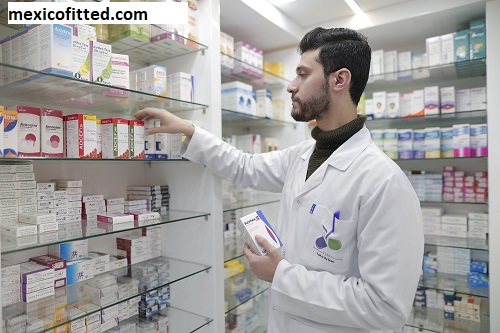Travel Pharmacy Technician: A Moving Career in Health Care:
Travel:
The healthcare industry’s landscape continues to shift, and careers that combine travel with professional expertise are gaining greater attention today. Among these are pharmacy technicians. This occupation allows certified pharmacy technicians to temporarily travel from one setting or assignment to another. Including hospitals, retail pharmacies, long-term care facilities, and other healthcare settings.

Dispensing medication is a very tasking job. However, being a pharmacy technician also affords the experience of new cities and work environments and meaningfully contributes to the healthcare system. Here, we look into the roles, benefits, challenges, and qualifications required to become a travel pharmacy technician.
What does a Travel Pharmacy Technician do?
Travel:
A travel pharmacy technician is a professional contracted for short-term periods of work in different locations at various pharmacy settings. Techs fill gaps in various pharmacy settings where permanent staff may be on leave, must be replaced because of shortages, or are scarce at peak demand. This mobility lends flexibility to the healthcare facilities and the technician.
Pharmacy technicians usually assist licensed pharmacists in the preparation and dispensation of prescription drugs, stock management, responding to patient inquiries, and filling up prescription records. The tasks that a travel pharmacy technician does are all similar with a different environment every time and are more varied.
High Responsibilities of a Pharmacy Technician:
Travel:
A travel pharmacy technician works in the same essential capacity as an ‘ordinary’ pharmacy technician. The fluidity of the role means settling into new surroundings, new operations, and different teams within incredibly short intervals. These include:
Preparation of medication:
Travel:
Pharmacy technicians from one location to another assisting pharmacists in preparing medications for patients – measuring and mixing medication, labeling containers, and ensuring dispensed prescriptions are correct.
Customer Contact:
Travel:
A travel pharmacy technician working out of a retail location may also be the first contact for patients, including answering questions, making claims, and ensuring patients know how to take prescribed medication.
Pharmacy technicians also have to keep inventory, which again is one of the most challenging things with the job. Obtaining, purchasing, and ensuring that drugs or medications are in stock, labeled, and stored properly is a huge stress when you’re working in unfamiliar pharmacies.
Data Entry and Record Keeping:
Travel:
The patient’s prescription should be recorded properly. Pharmacy technicians are compelled to learn many software systems found in different facilities and ensure that they do not enter anything that infringes on the health regulations that supervise healthcare, like HIPAA (Health Insurance Portability and Accountability Act).
Team Collaboration:
Travel:
Working as a pharmacy technician will make you so highly engaged with many teams and professionals. You’ll most probably require working with very good communication and collaboration skills to make the process successful in each new place of work.
Why Be a Travel Pharmacy Technician?
Travel:
Becoming a travel pharmacy technician can provide an opportunity with a wide array of benefits for the growth and adventure that professionals desire. Some of the major benefits include the following:
1. Work environment diversity
The biggest attraction of the pharmacy technician is the variety of opportunities. Be it a bustling hospital in an urban setting, a small, rural pharmacy, or perhaps some long-term care, the workflows and experiences are always different. This diversity provides a unique learning environment that allows the individual to build a broader set of skills compared to those with a more static lifestyle.
Travel assignments also expose technicians to new and advanced technologies or systems, enhancing their marketability in the job market. Pharmacy technicians become versatile and adaptable due to variations by health facilities in their protocols and tools.
2. Career Growth and Development
Travel:
Along with the increasing demand for pharmacies nationwide, especially in underserved areas, pharmacy technicians are in high demand. It also provides a chance for career advancement. Technicians are provided with the opportunity to get along with health professionals in different places within the industry; this further helps to make great relationships and amazing recommendations.
The opportunity to pursue studies for a license to be a registered pharmacist is one of the great learning opportunities offered by a pharmacy technician job. Exposure to several pharmacists and other healthcare systems will ensure that the best in practice is learned and diverse methods are applied in patient care.
3. Flexibility and Control Over Your Schedule
Indeed, many pharmacy technicians are attracted to the flexibility this role offers. A tech can pick and choose when and where he or she wants to work. If you want to take a couple of months off between assignments, go on location to different parts of the country, or just choose to stay local, the job affords great autonomy in shaping your schedule.
This flexibility provides a better work-life balance, which is very satisfying to those who enjoy exploring new cities, hiking through natural parks, or just experiencing life in other locations. As the contracts are short-term, the happenings do not pin you down to one place or one routine to keep the work exciting and fresh.

4. Attractive Compensation
Travel:
Pharmacy technicians usually earn more than regular permanent colleagues because of the temporary nature of their contracts, and there is usually the need to fill those places. Besides the competitive pay, agencies usually offer several benefits such as stipends, housing allowances, health insurance, and bonuses for longer assignments.
For the professional who aims at pay with experience, a pharmacy technician’s career path will be well rewarding.
Challenges Faced by Pharmacy Technicians:
Travel:
Being a travel pharmacy technician may sound exciting, but the job also has its challenges:
Frequent Relocation:
“Constant moving around different places is both exhilarating and taxing. Pharmacy technicians, especially, have to adapt to new cities, temporary housing, and diverse work environments. This might be challenging for some individuals who detest routine and cannot adjust to any form of disruption in daily routines.”.
Learning New Systems:
Every health facility will have different protocols, new software systems, and pharmacy management tools. A traveling pharmacy technician has to learn how to quickly adapt to changes without much time for training.
Isolation:
Travel:
You are going to spend hours in and will not find it easy to build long-term personal relationships. Sometimes you could feel isolated, especially when you spend longer periods away from family and friends.
Licensure and Certification:
Since pharmacy technician certification and licensure requirements vary among states in the United States, a pharmacy technician may be required to obtain several licenses. This takes time as well as sometimes money to receive. Most agencies assist the technicians with this, keeping the stays compliant over state lines.
Qualifications and How to Become a Pharmacy Technician:
Travel:
To become a pharmacy technician, one should begin with the appropriate degree and training certifications listed below:
Education:
Pharmacy technicians typically need to hold, at the very least, a high school diploma or equivalent; however, many pharmacy technicians have completed a pharmacy technician training program that may be completed through vocational schools or community colleges. These programs typically include an internship, and therefore the students can gain practical experience in pharmacy practice.
Certification Most widely acknowledged is through the Pharmacy Technician Certification Board (PTCB). Passing this exam establishes competencies in pharmaceutical practice and more extensively opens job opportunities.

Licensure differs by state:
The pharmacy technician should therefore check on the different licensing requirements of the states they are of interest to. Sometimes technicians would have to take an extra exam or be required to undergo some additional training before being licensed in specific states.
Most pharmacies prefer that a pharmacy technician have 1-2 years of experience working in a pharmacy before taking assignments.